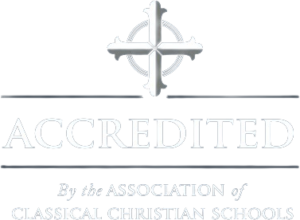Parents who have been at Providence for a while know that what their children are receiving at the school is something distinctly different. Sometimes I hear parents saying they have a hard time putting their finger on it, but they can see it in their children. What’s the difference? You can see it in their enthusiasm for learning, their ability to speak and write with clarity, their confidence in addressing an adult, their love for books and stories, their imagination and awareness of beauty, their ability to pick up new knowledge and concepts, their politeness and diligence. Ultimately, the difference lies in the work of God Himself in our children, as He makes the labors and classical methods of our talented teachers effective.
You sacrifice to send your children to PCCS because you care not just about their grey matter but about their souls. You care deeply about their relationship with the Lord and their future usefulness in the kingdom of God. You care about not just about your child’s job skills and college prospects but about your child’s virtue. “Add to your faith virtue,” writes St. Peter, and we take that admonition seriously (2 Pet 1:5). The environment of a classical Christian school is good soil for the fruits of a godly life and a consistent Christian worldview to take root.
G.K. Chesterton famously reminds us that “Education is not a subject and does not deal in subjects. It is instead a transfer of a way of life.” Amen. Our eyes may be on the next day’s homework assignment and the next week’s project, but our gaze is on the ultimate goal of maturity in Christ, with Christian virtue rooted in the hearts of our children and lived out for His glory.
An Ambrose Group publication considers what questions parents should ask when looking for a school for their children:
As parents, we all want our children to live fulfilling lives. But when we choose a school, we ask the wrong questions. Ask not about preparation for college at 18, but life at 45. How will she show honor to her aging parents? How will she respond when family challenges arise? What priorities will she have when her husband gets that big payout from his company? Where will she invest her life?
Ultimately, these answers are rooted, at least to a significant degree, in the paideia of their childhood, as used by the Holy Spirit.
The publication goes on to show how in classical Christian education “the ideal meets the practical.”
If you ask an employer, “Would you rather have a virtuous employee, or a smart one?” they’ll say “virtuous,” but in their mind, they’re thinking, “But I need skills.” What if you ask an employer, “Would you hire someone who had the fortitude to get any task done no matter what the challenge, but enough temperance not to overdo it? How about a fair-minded employee who makes sure to serve customers in the right order, but one who realizes that prudence should govern their sense of fairness?” Their eyes will light up.
Anyone who manages people looks for the 7 classical Christian virtues — they just may not realize it. When you hear “virtue,” you probably think character, or a moral code, or doing what’s right. But classical virtues were much more, and they were instilled in students through education at school and at home. They are loves or affections that drive behavior — not because the students knew right from wrong but because they simply loved what was right. Classical Christian schools weave virtues like fortitude, temperance, justice, prudence, faith, hope, and love (the classical Christian virtues) into students on a daily basis. They don’t just teach about these virtues, they expect children to form habits that exhibit these virtues.
This, parents, is what you’ve signed up for! Let’s stay committed together to this great vision. All your dedication and sacrifice is worth it, and God, by His grace, has promised to bless your faithfulness. “Know therefore that the Lord your God is God, the faithful God who keeps covenant and steadfast love with those who love him and keep his commandments, to a thousand generations” (Deut 7:9).
Parents who have been at Providence for a while know that what their children are receiving at the school is something distinctly different. Sometimes I hear parents saying they have a hard time putting their finger on it, but they can see it in their children. What’s the difference? You can see it in their enthusiasm for learning, their ability to speak and write with clarity, their confidence in addressing an adult, their love for books and stories, their imagination and awareness of beauty, their ability to pick up new knowledge and concepts, their politeness and diligence. Ultimately, the difference lies in the work of God Himself in our children, as He makes the labors and classical methods of our talented teachers effective.
You sacrifice to send your children to PCCS because you care not just about their grey matter but about their souls. You care deeply about their relationship with the Lord and their future usefulness in the kingdom of God. You care about not just about your child’s job skills and college prospects but about your child’s virtue. “Add to your faith virtue,” writes St. Peter, and we take that admonition seriously (2 Pet 1:5). The environment of a classical Christian school is good soil for the fruits of a godly life and a consistent Christian worldview to take root.
G.K. Chesterton famously reminds us that “Education is not a subject and does not deal in subjects. It is instead a transfer of a way of life.” Amen. Our eyes may be on the next day’s homework assignment and the next week’s project, but our gaze is on the ultimate goal of maturity in Christ, with Christian virtue rooted in the hearts of our children and lived out for His glory.
An Ambrose Group publication considers what questions parents should ask when looking for a school for their children:
As parents, we all want our children to live fulfilling lives. But when we choose a school, we ask the wrong questions. Ask not about preparation for college at 18, but life at 45. How will she show honor to her aging parents? How will she respond when family challenges arise? What priorities will she have when her husband gets that big payout from his company? Where will she invest her life?
Ultimately, these answers are rooted, at least to a significant degree, in the paideia of their childhood, as used by the Holy Spirit.
The publication goes on to show how in classical Christian education “the ideal meets the practical.”
If you ask an employer, “Would you rather have a virtuous employee, or a smart one?” they’ll say “virtuous,” but in their mind, they’re thinking, “But I need skills.” What if you ask an employer, “Would you hire someone who had the fortitude to get any task done no matter what the challenge, but enough temperance not to overdo it? How about a fair-minded employee who makes sure to serve customers in the right order, but one who realizes that prudence should govern their sense of fairness?” Their eyes will light up.
Anyone who manages people looks for the 7 classical Christian virtues — they just may not realize it. When you hear “virtue,” you probably think character, or a moral code, or doing what’s right. But classical virtues were much more, and they were instilled in students through education at school and at home. They are loves or affections that drive behavior — not because the students knew right from wrong but because they simply loved what was right. Classical Christian schools weave virtues like fortitude, temperance, justice, prudence, faith, hope, and love (the classical Christian virtues) into students on a daily basis. They don’t just teach about these virtues, they expect children to form habits that exhibit these virtues.
This, parents, is what you’ve signed up for!
Let’s stay committed together to this great vision. All your dedication and sacrifice is worth it, and God, by His grace, has promised to bless your faithfulness. “Know therefore that the Lord your God is God, the faithful God who keeps covenant and steadfast love with those who love him and keep his commandments, to a thousand generations” (Deut 7:9).








